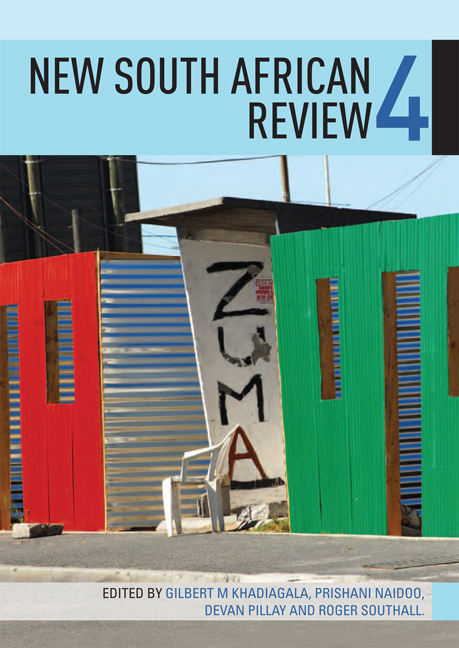Book contents
- Frontmatter
- Contents
- Preface
- Introduction: South Africa's fragile democracy: Twenty years on
- PART ONE ECOLOGY, ECONOMY AND LABOUR
- PART TWO POWER, POLITICS AND PARTICIPATION
- PART THREE PUBLIC POLICY AND SOCIAL PRACTICE
- Introduction
- Chapter 11 Why does Zimbabwe's school system out-perform South Africa's?
- Chapter 12 Higher Education in 2013: At many crossroads
- Chapter 13 Democracy without economic emancipation: Household relations and policy in South Africa
- Chapter 14 Prisons, the law and overcrowding
- PART FOUR SOUTH AFRICA AT LARGE
- Contributors
- Index
Chapter 11 - Why does Zimbabwe's school system out-perform South Africa's?
from PART THREE - PUBLIC POLICY AND SOCIAL PRACTICE
Published online by Cambridge University Press: 21 April 2018
- Frontmatter
- Contents
- Preface
- Introduction: South Africa's fragile democracy: Twenty years on
- PART ONE ECOLOGY, ECONOMY AND LABOUR
- PART TWO POWER, POLITICS AND PARTICIPATION
- PART THREE PUBLIC POLICY AND SOCIAL PRACTICE
- Introduction
- Chapter 11 Why does Zimbabwe's school system out-perform South Africa's?
- Chapter 12 Higher Education in 2013: At many crossroads
- Chapter 13 Democracy without economic emancipation: Household relations and policy in South Africa
- Chapter 14 Prisons, the law and overcrowding
- PART FOUR SOUTH AFRICA AT LARGE
- Contributors
- Index
Summary
INTRODUCTION
Since 1994 the South African school system is believed to have been performing relatively poorly in comparison to the Zimbabwean system, although the expenditure per learner is much higher and the Zimbabwean schooling system has been severely affected by the economic chaos of the last decade. Comparing school systems, however, is a dangerous academic exercise because every system is innately different, with its own history, structure and processes. With a warning, this chapter tries to do exactly that. The justification for this perilous venture is that as South Africans deal with the low performance and high cost of their school system some commentators have been comparing its failure to what is seen as the success of the Zimbabwean school system. This chapter explores to what extent that comparison is valid and, if if it is, what South Africa can learn from the Zimbabwean school system. It looks at the development of the school systems in both countries from before independence to the present and then engages in a limited comparison based on a few salient factors. It is not meant to be exhaustive and is more suggestive than conclusive.
The assertion that the South African school system is worse than the Zimbabwean school system is largely based on two indicators: the relative positions of the two countries’ scores in the learner comparability tests and the claim that Zimbabweans living in South Africa tend to speak better English and seem better educated and more employable than their South African counterparts. These are partial and subjective indicators.
COMPARATIVE DATA FROM BOTH SCHOOL SYSTEMS
The only international comparability testing process in which South Africa and Zimbabwe both participate is the Southern and Eastern African consortium for Monitoring Education Quality (SACMEQ). Zimbabwe is not a participant in either Trends in International Mathematics and Science Study (TIMSS) or Progress in International Reading Literacy Study (PIRLS). The basis for comparison based on test scores is therefore limited. However, it is worth exploring SACMEQ. In the Grade 6 tests in 2007 the scores were as follows:
There is a substantial difference between the two countries’ scores, particularly for mathematics.
- Type
- Chapter
- Information
- New South African Review , pp. 204 - 222Publisher: Wits University PressPrint publication year: 2014



